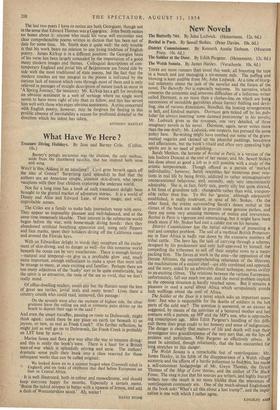New Novels
District Commissioner. By Kenneth Austin Dobson. (Museum Press. 10s. 6d.)
The Soldier at the Door. By Edith Pargeter. (Heinemann. 12s. 6d.)
The Welsh Sonata. By James Hanley. (Verschoyle. 10s. 6d.)
THERE are more runners than usual this week, all breasting the tape in a bunch and just managing a six-minute mile. The puffing and blowing is least audible from Mr. John Lodwick. At a time of liturg- ical solemnity about the task of the novelist and the future of the novel, The Butterfly Net is especially welcome. Its narrative, which concerns the economic and amorous difficulties of a ludicrous writer called Dormant, is no more than a clothes-line on which are hung successions of incredible garrulities about literary fiddling and devil- ling, sins of various dimensions, Stendhal, the heating arrangements in hell, and kindred matters. Dormant gets ticked off by his pub- lisher for always inserting 'some damned pantomime' in his novels; Mr. Lodwick gives us the synopses, one very detailed, of three imaginary novels in his novel. Dormant, again, never writes more than the one draft; Mr. Lodwick, one suspects, has pursued the same policy here. Re-writing might have combed out some of the gram- matical vagaries and cleaned up the plentiful paddings, borcdoms and affectations, but the book's ribald and often very appealing high spirits are in no need of polishing.
Sarah Menken, the heroine of Recital in Parii, is a version of the late Isadora Duncan at the end of her career, and Mr. Sewell Stokes has done about as good a job as is still possible with a study of the artistic temperament. Though offered as a person of 'marked individuality,' however, Sarah resembles her numerous poor rela- tions in real life by being firstly, addicted to rather unimaginatively unconventional behaviour, and, secondly, only very intermittently admirable. She is, in fact, fairly nice, pretty silly but quite shrewd, a bit fond of grandiose talk: changeable rather than wild, irrespon- sible rather than free. To this her 'genius,' although adequately established, is really irrelevant, in spite of Mr. Stokes. On the other hand, the events surrounding Sarah's dance recital at the climax of the book are made to provide some genuine pathos, and there are some very amusing moments of malice and irreverence. Recital in Paris is vigorous and entertaining, but it might have been much more if Mr. Stokes had cast a colder eye on his heroine.
District Commissioner has the, initial advantage of presenting a real and complex problem. The soil of a mythical British Protector- ate in East Africa is badly run down by the excessive numbers of tribal cattle. The hero has the task of carrying through a scheme, designed by his predecessor and only half-approved by himself, for compelling the tribesmen to sell off their surplus cows to a meat- packing firm. The forces at work in the area—the opposition of the literate Africans, the uncomprehending reluctance of the illiterate, the machinations of a sinister chief—are ably combined and opposed, and the story, aided by an admirably direct technique, moves swiftly to an exciting climax. The relations between the various Europeans, unfortunately, fall out much too pat, and the moral problem implicit in the opening situation is hardly touched upon. But it remains a pleasure to read a novel about Africa which scrupulously avoids lush wafflings about the soul of Africa.
The Soldier at the Door is a novel which asks an important ques- tion: Just who is responsible for the deaths of soldiers in the hot
parts of the cold war? The question is answered, or an answer is suggested, by means of the activities of a bereaved mother and her contacts with a parson, an MP and the MP's son, who is approach- ing conscription age. Miss Edith Pargeter's handling of this diffi- cult theme does great credit to her honesty and sense of indignation. The danger is clearly that matters of life and death will trap their
investigator into grandiloquence of the very sort that, on the lips of prelates and politicians, Miss Pargeter so effectively rebuts. It must be admitted, though reluctantly, that she has succumbed for long stretches to this danger.
The Welsh Sonata is a remarkable feat of ventriloquism: Mr. James Hanley, in his fable of the disappearance of a Welsh village
eccentric and the efforts of a bardic policeman to finckltim, has made
a self-consistent hodgepodge of Mr. Gwyn Thomas, the Dylan Thomas of the Map of Love stories, and the author of The Black Venus. The snag is just that his sources are writers, and highly literary writers too—the result is no more lifelike than the utterances of ventriloquism commonly are. One of the much-abused Englishmen in the book asks 'What's all this about a lost tramp?', and the impli- cation is one with which I rather agree.


































 Previous page
Previous page